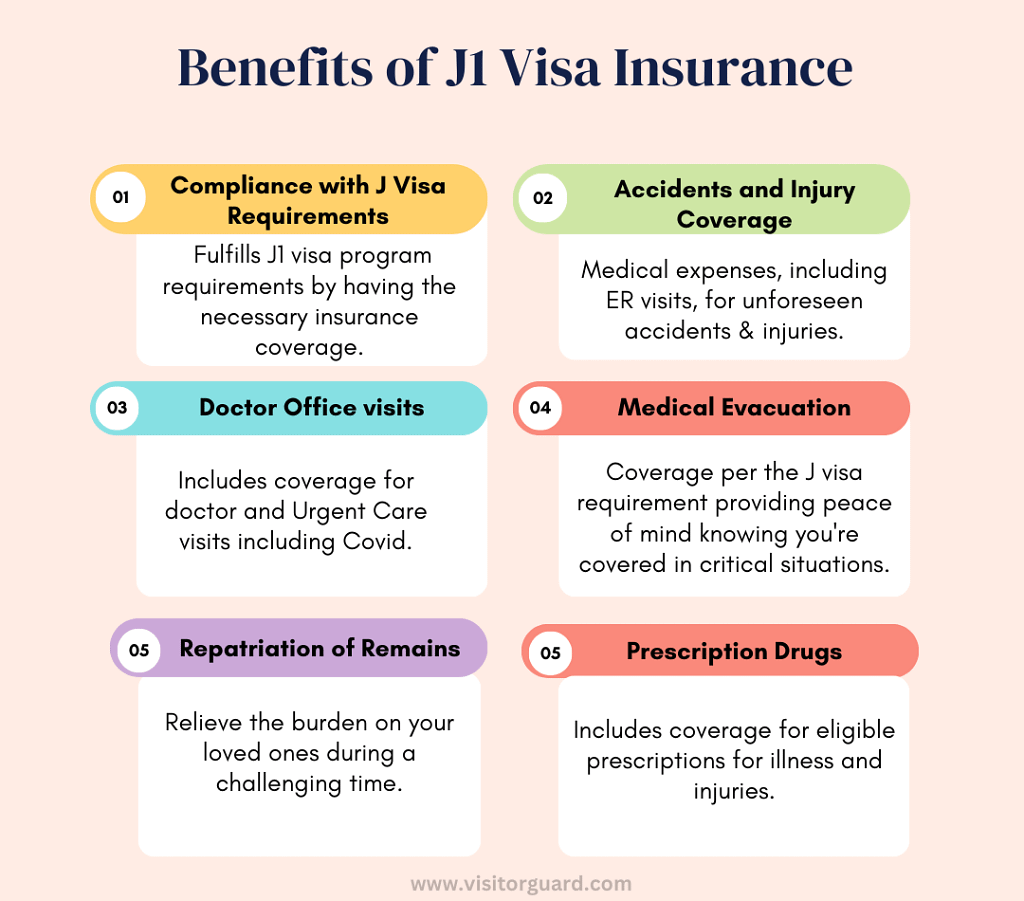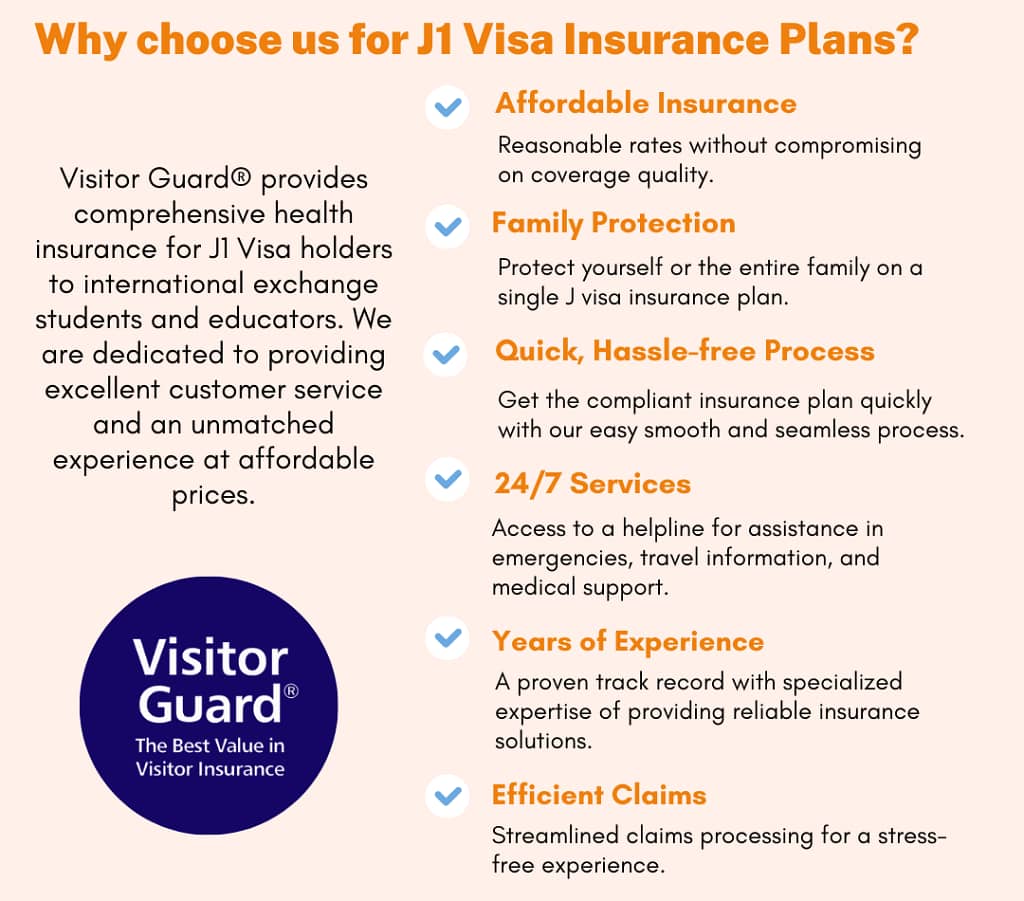J1 Visa Health Insurance USA
Enjoy your term in the U.S. with our hassle-free and affordable J1 visa health insurance plans. We help J1 Visa holders make smart decisions by getting the right insurance cover to look after them in a foreign land.
Visitor Guard®: J1 Visa Health Insurance Made Easy
The J-1 Visa allows approved individuals to enroll in work and study-based exchange programs in order to teach, study, conduct research, or receive job training. Our J visa health insurance plans satisfy the demands of the U.S. Department of State.
We provide a full range of medical insurance plans for international students and visitors designed to fit all your needs.
Visitor Guard® is a top-rated J1 Visa health insurance company in the USA. We meet your needs by providing the most comprehensive J visa health insurance plans and student travel insurance available. It’s our job to make sure you know exactly what you’re covered by the insurance.

J1 Visa Health Insurance Requirements
The US Department of State has a set of minimum insurance requirements for the J1 and J2 visa holders. The sponsoring organization might also have its own additional insurance requirements for exchange students, scholars, and Au Pair.
As per the US government (22 CFR 62.14), the following are the new J1 visa insurance requirements:
- Medical benefits of at least $100,000 per accident or illness
- Repatriation of remains of at least $25,000
- Expenses of $50,000 associated with the medical evacuation of the visitor to their home country
- $500 maximum deductible allowed per illness or injury
- Plan to be underwritten by an insurance corporation with-
- An A.M. Best rating of “A-” or above,
- Or an Insurance Solvency International Ltd. (ISI) rating of “A-I” or above,
- Or a Standard and Poor’s Claims Paying Ability rating of “A-” or above,
- Or a Weiss Research Inc. rating of B+ or above.
Check with your sponsoring organization (school, University, or work-exchange organization) for their additional requirements, if any.
Get Quote Now
J1 Visa Health Insurance Plans for Exchange Visitors, Students
Atlas America
$58 / mo For age 24 years with $100,000 plan and $250 deductible- Plan maximum limits ranging from $50,000 to $2 million
- Deductible options from $0 to $5,000
- Coverage for Hospitalization, ER, Urgent Care, Dr. Office Visits, Prescription Drugs, Covid-19
- Coverage for non-chronic Acute Onset of Pre-existing conditions
- Coverage from 5 days to 364 days
- Brochure
- Review Plan
Patriot Exchange
$61 / mo For age 24 years with $100,000 plan and $250 deductible- Plan maximum limits ranging from $50,000 to $500,000
- Deductible options from $0 to $500
- Coverage for Hospitalization, ER, Urgent Care, Dr. Office Visits, Prescription Drugs, Covid-19
- Coverage for Pre-existing conditions after 12 months of continuous coverage
- Coverage from 5 days to 48 continuous months
- Brochure
- Review Plan
Atlas Premium
$116 / mo For age 24 years with $100,000 plan and $250 deductible- Plan maximum limits ranging from $50,000 to $2 million
- Deductible options from $0 to $5,000
- Coverage for Hospitalization, ER, Urgent Care, Dr. Office Visits, Prescription Drugs, Covid-19
- Coverage for non-chronic Acute Onset of Pre-existing conditions
- Coverage from 5 days to 364 days
- Brochure
- Review Plan
Study USA
$39 / mo For age 24 years with $200,000 plan and $250 deductible- Plan maximum limits ranging from $100,000 to $500,000
- Deductible options from $25 to $250
- Coverage for Hospitalization, ER, Urgent Care, Dr. Office Visits, Prescription Drugs, Mental health, Pregnancy
- Coverage for Covid-19 (excluded on Basic)
- Coverage from 30 days to 4 years
- Brochure
- Review Plan
Student Secure
$50 / mo For age 24 years with $250,000 plan and $90 deductible- Plan maximum limits ranging from $100,000 to $500,000
- Deductible options from $25 to $50 based on the plan
- Coverage for Hospitalization, ER, Urgent Care, Dr. Office Visits, Prescription Drugs, Mental Health, Pregnancy, Covid-19 (excluded on the Smart plan)
- Coverage for non-chronic Acute Onset of Pre-existing conditions
- Coverage from 5 days to 364 days
- Brochure
GeoBlue Navigator
$196 / mo For age 24 years with Unlimited coverage and $250 deductible- Unlimited annual and lifetime medical maximum
- Deductible options from $250 to $5,000
- Coverage for Hospitalization, ER, Urgent Care, Dr. Office Visits, Prescription Drugs, Covid-19
- Pre-existing conditions exclusion waived with prior creditable coverage
- Coverage for a minimum of 3 months
- Brochure
Student Health Advantage
$135 / mo- Plan maximum limit of $300,000 per incident
- Deductible of $100 per incident
- Coverage for Hospitalization, ER, Urgent Care, Dr. Office Visits, Prescription Drugs, Mental Health, Pregnancy, Covid-19
- Coverage for Pre-existing conditions after 6 month waiting period
- Coverage from 1 months to maximum of 60 months
- Brochure
Student Health Advantage Platinum
$396 / mo For age 24 years with $500,000 plan and $25 deductible- Plan maximum limit of $500,000 per incident
- Deductible of$25 per incident $0 to $5,000
- Coverage for Hospitalization, ER, Urgent Care, Dr. Office Visits, Prescription Drugs, Mental Health, Pregnancy, Covid-19
- Coverage for Pre-existing conditions after 6 month waiting period
- Coverage from 1 months to maximum of 60 months
- Brochure

What is J1 Visa Insurance?
J1 visa insurance is designed for J1 visa holders coming to the US for a temporary stay for an exchange program. The insurance plans must meet the requirements of the US Department of State. The plans cover medical expenses, repatriation of remains, medical and political evacuation, acute onset of pre-existing conditions, trip benefits, and more. The J1 visa insurance plans keep the finances safe while the visitors can focus on their training and education.
It is mandatory for J visa holders to purchase J1 visa insurance that meets US State Department’s guidelines. The plans cover medical expenses for new illnesses and injuries. These plans can also cover medical evacuation, repatriation of remains, political evacuation, acute onset of non-chronic pre-existing conditions, COVID-19, and more. Check the brochure to know the plan’s coverage.
What is J1 visa & J2 Visa?
The J1 visa is a non-immigrant visa that is issued by the US to research scholars, professors, part-time teachers, au-pairs, students, and other visitors who have come to the US to take part in cultural exchange programs. The exchange visitors receive training, gain experience, hone their skills, or pursue education, which they can use after returning to their home country. J1 visa holders must have educational and professional qualifications before coming to the US.
J2 visa holders are the dependents of J1 visa holders. It is a non-immigrant visa issued by the US to the spouses and children of J1 exchange visitors. J2 visa holders with Employment Authorization Document can work in the US without sponsorship. They can request work authorization by submitting the I-765 form to the United State Citizenship and Immigration Services.
Why is J1 visa insurance important?
J visa holders must buy insurance that meets the US Department of State’s guidelines. The basic requirement includes $100,000 for medical benefits per illness or accident, $25,000 for repatriation of remains, $50,000 for medical evacuation, and not more than a $500 deductible per illness or accident.
Without J1 visa insurance, exchange visitors cannot come to the US. The plans offer comprehensive coverage to visitors during their temporary stay. Visitors can get cashless treatment for their eligible medical emergencies, helping them safeguard their finances. Typically, the J visa scholars do not have to pay money from their pockets when a medical situation arises. As each plan has different coverages, not all plans will suit every exchange visitor’s needs. For example, some plans can cover complications of pregnancy, while others can cover non-chronic acute onset of pre-existing conditions.
What does J1 visa health insurance cover?
J1 visa health insurance plans cover eligible medical expenses, doctor’s visits, urgent care, emergency room visit, prescriptions and drugs, COVID-19, acute onset of non-chronic pre-existing conditions, medical and political evacuation, repatriation of remains, and more.
Not all plans will cover everything because each plan have different benefits. Therefore, it is advisable to check the policy certificate and choose one that fits one’s travel needs.

Who needs J1 Visa Health Insurance?
A J1 visa is a type of non-immigrant visa. The primary goal of this type of visa is to encourage the development of relationships between the U.S. and other nations. This program is overseen by the U.S. Department of State (DOS).
Visitors who participate in the J1 exchange visitor program can travel to the U.S. for the duration of their programs.
Many government-approved sponsors offer programs across fifteen different categories. These categories are Trainee, Teacher, International travel for summer work, Specialist, Short-term scholar, Secondary, School student, Research scholar, Professor, Physician, International visitor, Intern, Government visitor, College and university international student, Camp counselor, Au pair.
Participants through these sponsor programs need to meet a minimum requirement of J visa health insurance. This health insurance could be on an individual or group basis.

What is a J1 Visa Program?
J1 visa programs offer cultural and educational exchange opportunities throughout the US. Established in 1961 under the Mutual Educational and Cultural Exchange Act, exchange programs have served an essential role in maintaining and strengthening international ties. Thousands of individuals come to the US annually to study in schools, colleges, universities, and research institutions to build intercultural skills and professional networks.
J1 visa programs provide countless opportunities to international visitors looking to gain experience and knowledge in the US. Some programs that one can apply for are:
- Au pair
- Camp counselor
- Government visitor
- College or university student
- Intern
- International visitor
- Physician
- Professor
- Research scholar
- Secondary school student
- Short-term scholar
- Specialists
- STEM (Science, Technology, Engineering, and Mathematics) initiatives
- Teacher
- Trainer
- Summer work travel
What is a J1 student visa?
The J1 student visa is designed for international students coming to the US to take part in study exchange programs under colleges or universities accredited by the government. When applying for a J1 student visa, students must submit a DS-2019 form. The form has all the information, including the program’s cost, start and end dates, and other details.
The duration of stay depends on the course of programs an international student selects. For instance:
- Secondary school students on J1 visas can study in accredited public or private schools in the US for an academic semester or a year. They must have completed 11 years of education in their home country and be aged between 15 and 18.5 years. The duration of the stay is not less than one academic semester or no more than two academic semesters.
- College or university students on J1 visas can take part in non-degree or degree programs in accredited post-secondary educational institutions. They must hold a college or university degree or non-degree. They are allowed to stay in the US for the duration of the course- 24 months (about 2 years) for non-degree students and 12 months for interns.
- International students coming to the US on J1 visas for summer work travel get the opportunity to work in temporary jobs. However, they must be a full-time academic student enrolled in a college or university outside the US. Besides, students serving as camp counselors must be 18 years of age and hold specialized skills in their home country. The duration of these programs is four months, respectively.
Best J1 Visa Health Insurance Provider in the US
Visitor Guard® is a leading J1 Visa health insurance provider in the USA. We have been offering affordable health insurance plans since 2003. We provide an easy way to find the best and most comprehensive health insurance plans for you.
When you purchase a policy from the Visitor Guard®, you work directly with the carrier. By working directly with us, you can be assured that your claims will never get lost in the shuffle of paperwork or administrative barriers.
Our professional team assists you in comparing plans, benefits, exclusions, premiums, and policy cancellation terms to help you make an informed decision. Plus, our exchange visa insurance reviews can help you understand that none of our customers are dissatisfied with our service and suggested plans. We take our customers’ queries seriously and propose a policy that works in favor of them.
How much does J Visa Health Insurance Cost?
Plan Name
Deductible options
Cost/Month
ATLAS AMERICA
$0 to $5,000
$58
PATRIOT EXCHANGE
$0 to $500
$57
ATLAS PREMIUM
$0 to $5,000
$116
Health Insurance for J1 Visa Holders - Exchange Visa (J1 and J2 type)
A J-1 visa is a short-term, non-immigrant visa the USA issues for international visitors. It permits approved individuals to enroll in work-and-study-based exchange programs to teach, study, conduct research, or receive on-site job training in the USA. Their spouses, children, or other dependents can travel on a J2 visa.
Exchange Visa (J1 and J2 type) holders in the US need to have health insurance to keep the visas valid, as per the policy. Health insurance for J1 visa holders must meet certain requirements laid down by the Department of State. The insurance must cover medical expenses, evacuation, and repatriation.
Once you apply for insurance here, J1 health insurance coverage can begin on any day as per your choice, starting from the day next. You can apply for the insurance easily online and purchase using a credit card. You do not need to have any medical tests to apply for these plans. Applications require some basic details like your name, date of birth, address, and sometimes passport number. You will receive a confirmation including ID Cards immediately by email. And if the sponsoring organization requires a waiver form to complete, our experienced service team can complete the form and send it to the concerned organization.

J1 visa health insurance cost
Exchange student age | Plan medical limit | Premium |
|---|---|---|
18 – 29 years | $100,000 | $47 per month |
18 to 29 years | $100,000 | $61 per month |
30 to 39 years | $100,000 | $62 per month |
Know before you buy your J1 Travel Insurance
J1 visa medical insurance is a part of the immigration process, but it is really helpful for any accidents or sudden injuries while traveling. Medica care in the US is expensive, and it might bill you hundreds of thousands of dollars without any insurance.
Patriot Exchange is an ideal plan for students studying abroad or participants of cultural exchange programs. It is specifically designed to meet the US J1 and J2 visa health insurance requirements for individuals or groups of five or more- who are studying abroad or participating in cultural exchange programs.
You hopefully will never use your exchange student health insurance. But it is a requirement to obtain your J1 or J2 visa. Compare as many J1 health insurances as you can to check which one suits you the best in terms of eligibility, coverage, exclusions, and premium. Choose wisely and enjoy your travel experience!
How to Get J1 Visa Health Insurance?
Complete the quote form above to see plans catered to your specific needs.
Compare insurance plans in terms of pricing, coverage amount, benefits, and exclusions- check which one matches your needs
Purchase a plan from one of our trusted insurance providers online in an instant
Check your email for Insurance documents.

Considerations for Purchasing J1 Visa Health Insurance
The US Department of State has a set of minimum insurance requirements for scholars, students, and au pairs on J1 and J2 visas. Also, your sponsoring organization (like school, University, or work-exchange organization) can have some additional insurance requirements.
You can compare the options for J visa insurance on this page for suitable plans, benefits, exclusions, and policy cancellation terms. Several qualifying plans encourage you to go to any hospital or provider and offer special incentives (like cashless claims settlement, waiver, or deductible) if the insured member avails services from the healthcare providers within a preferred PPO network.
The student health insurance plans are intended for-
- J1 and J2 visa holders
- Au pairs, interns, and trainees
- Government employees and cultural exchange participants
- Individuals and groups participating in international student programs
- International graduate students, scholars, and educators
- Dependents of international study program participants
Understanding the Requirements for J1 VISA Health Insurance
What is Evacuation?
Emergency Medical Evacuation is the transportation to the nearest hospital that is qualified to provide the Medically Necessary Treatment to prevent the Insured Person’s loss of life or limb.
What is Repatriation?
If a covered illness/injury results in the death of the insured person, expenses for repatriation of bodily remains or ashes to the country of residence.
What is Medical Maximum?
The maximum amount that the policy will cover for the treatment of an injury or illness.
J1 Visa Health Insurance Exclusions
Some policies cover pre-existing conditions like diabetes, high blood pressure, kidney diseases, etc. up to a certain limit, though most J1 visa health insurance providers exclude this aspect.
- Preventative care
- Eyecare
- Foot care
- Infertility and birth control
- Sport-related injury
- Injury or death from catastrophic events
- Suicide
- Cosmetic and experimental procedures

Types of Insurance Options for J2 Visa Holders
J2 visa holders need to also meet the same minimum insurance requirements as the J 1 visa holder. The dependent J2 visa holder may be eligible for an individual or a group policy depending on the sponsoring organization. There are various ways these dependents can consider insurance:
- Individual Insurance– Sometimes, sponsors only provide the J1 visa holder with insurance options and not the J2 dependents. In such situations, these scholars, exchange students, and au pairs will need to maintain insurance coverage throughout their time in the US and can purchase individual insurance instead.
- Sponsor Provided Insurance- The sponsoring organization might provide J2 spouses and children the option to enroll in their group insurance that will meet the minimum requirements.
- Insurance through Employer– At the place of work, J1 or J2 visa holders sometimes may have their employer offer insurance coverage through their group policy.
J1 Visa Health Insurance - FAQ
Yes. Exchange visitors must purchase J1 visa insurance plans that meet the US Department of State’s guidelines.
Patriot Exchange, Study USA, Student Secure, Geoblue Navigator, Atlas America, and Student Health Advantage are some popular J1 visa insurance plans. To know what suits you the best, call us.
If you do plan to travel outside the US during the program, you should get in touch with your sponsor for a travel validation signature before you leave the US. In the event you travel outside the US after the end of the program in the 30 day grace period, your J visa and your DS-2019 will have expired and re-entry into the US will be possible with a new J visa through a new program.
Whether you will be covered by your insurance policy when you travel outside the US will depend on the policy you have bought. The J visa insurance plans bought on this site can offer you coverage during your short trips outside the US. You should always call our agents to confirm before your trip.
It would depend on the eligibility criteria for that policy. It is best to talk to the insurance administrator to find out the eligibility for the plan. On this site, there are various options available for J2 visa holders that meet the minimum requirement in order to participate in the programs. Patriot Exchange is one of the plans that meet this requirement.
J1 visa holders and their dependents are required to have adequate health insurance in order to participate in the programs. During the time the J visa holders are on the program, the program sponsors must ensure that the J visa exchange visitors have insurance that includes minimum coverage and benefits that cover them for sickness or accidents during the duration of the program. These minimum requirements are –
- Medical benefits of at least $100,000 per accident or illness
- Repatriation of remains coverage amounting to $25,000
- Expenses associated with the emergency medical evacuation of the exchange visitor to their home country of $50,000
- A deductible of no more than $500 per accident or illness
J1 visa insurance policies must also be underwritten by an insurance company that possesses one of the following:
- An A.M. Best rating of “A-” or above;
- An Insurance Solvency International, Ltd. (ISI) rating of “A-1” or above;
- A Standard and Poors Claims Paying Ability rating of “A-” or above; or
- A Weiss Research, Inc. rating of B+ or above.
Sponsors need to ensure that their J1 visa program participants and their dependents have health insurance that has the above-listed J visa insurance requirements and is backed by the full faith and credit of the government of the participant’s home country.
Dependents of J1 visa holders accompanying them to the US during their J1 visa program, who are the J2 visa holders, are subject to the same J visa insurance requirements. They are also required to have health insurance coverage throughout their stay in the US.
If J1 or J2 visa holders fail to meet the necessary medical insurance requirements, it may even result in termination from the exchange program.
J1, as well as H-1B, are both temporary nonimmigrant visas. These visas allow foreign nationals to live and work in the U.S. The J1 is based on programs while the H-1B uses employers as sponsors.
You Can change your J1 visa to a working H-1B visa. However, there are various pros and cons in doing so. Be sure to understand all the requirements, advantages and disadvantages for changing J1 to a working visa.
Annual multi-trip plans can work best for businessmen, executives, and frequent overseas travelers. These plans provide coverage for a whole year and are typically cheaper than buying single trip travel insurance plans. Annual trips however may have limits on the length of trips ranging from 15 to 45 days or more depending on the policy you choose. Single trip insurance may be better if you do not travel frequently.
As a J-visa holder, if you plan to travel outside the US during your program, it is a good idea to first check if your policy does cover you outside before you opt for another insurance.
It is always a good practice to have travel insurance when traveling outside your country.
There are various insurance companies that provide J visa health insurance. You can answer the questions on the top of the page to compare the various J visa health insurance options available to you, select the plan that covers all your needs, and then fill up the application online and complete the purchase.
It is always recommended to opt for insurance from the USA rather than from India or other countries while visiting. The hospitals and care centers are familiar with the network and insurance providers of the USA, and they can easily send the bills directly to the insurance company. So you can enjoy a mostly cashless payment procedure, and hence less hassle.
The US insurance companies are more familiar with the medical cost and needs, so they design the policies for the maximum benefit of the visitors from India to the US. Be it for younger or older travelers, the US insurance companies have a wide range and choice of policies for all kinds of needs and preferences.
The whole purpose of a Summer Work Travel program is to provide foreign students with an opportunity to live and work in the United States during their summer vacation from college or university so they can experience and be exposed to the people and way of life in the United States.
The primary requirements of Summer Work and Travel students are:
- Sufficiently proficient in English to successfully interact in an English speaking environment
- Post-secondary school students enrolled in and actively pursuing a degree or other full-time course of study at an accredited classroom-based, post-secondary educational institution outside the United States
- Have successfully completed at least one semester or the equivalent of post-secondary academic study
- Pre-placed in a job prior to entry unless from a visa waiver country
Once you fulfill the above and are able to participate in a program, you will need summer work travel insurance. you can compare the plans on this site to fulfill the summer work travel insurance requirements.
You can purchase visitors’ insurance before you start the journey or even after you arrive in the US. It is recommended to buy the policy in advance so the journey may also be covered (based on the policy). The whole process is online and it does not take any hassle of medical check-ups, so you can buy whenever and wherever you want. The coverage can begin as early as the very next day, and the documents can be emailed to you immediately after purchase.
The Summer Work and Travel program lasts up to a maximum of four (4) months. Participants may not work at any other time except during the period indicated on the DS-2019 form.
In Germany, it is compulsory for host families to pay for insurance for their Au Pairs. The Au Pair insurance must comprise travel health insurance, liability insurance, and accident insurance. Patriot Exchange provides per-incident coverage for hospitalization, intensive care, surgery, and prescription drugs up to the chosen policy maximum. It includes coverage for accidental death and dismemberment as well as personal liability.
Medical help can be expensive, especially outside your home country. So insurance is one of the basic requirements when you stay abroad. Requirements of your insurance may vary based on the Au Pair’s citizenship, length of stay, and the chosen host country.
Some countries require the host family to take care of the insurance coverage for their Au Pair, some require them to register with private healthcare insurance, while some countries might need them to enroll in the National Health Care System. It is important to find out the requirements of the host country and look for insurance accordingly. In the US, Au Pair’s have been designated by the U.S. Government as an Exchange Visitor Program, enabling participants to use the J1 visa. Patriot Exchange is a popular plan meeting the minimum requirement for individuals on a J visa.
Having health insurance and an Au Pair contract outlining the work provides a legal and safe stay in Germany. It will work as a financial pillow if you face any unfavorable situation while staying in Germany, as high medical costs can disrupt your budget. Au pairs will need to show the insurance confirmation to the German Embassy as well as when you enter the country. The Host family must cover the insurance costs in this case. You can also consider private Health insurance.
You can consider the Comprehensive plan options for health insurance.
Every insurance policy is different. Depending on the policy you opt for, pandemics like coronavirus may be excluded. Safe Travel USA Comprehensive policy is one of the policies that treat Covid-19 as any other illness. It has not excluded treatment as long as it is not a pre-existing condition.



